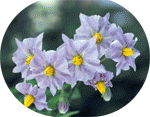| Abstract Detail
Tuesday Afternoon Ecology and Adaptation Kuhlemeier, Cris [1], Hoballah, Maria-Elena [2], Guebitz, Thomas [2], Stuurman, Jeroen [1], Barone, Mario [1]. Genetic dissection of pollination syndromes in Petunia. ANIMAL-MEDIATED pollination is essential in the reproductive biology of many flowering plants and tends to be associated with pollination syndromes, sets of floral traits that are adapted to particular groups of pollinators. The complexity and functional convergence of various traits within pollination syndromes are outstanding examples of biological adaptation, raising questions about their mechanisms and origins. Elucidation of the molecular-genetic basis of this interesting reproductive biology requires a model system that combines distinct pollination syndromes with excellent molecular and classical genetics. In the genus Petunia, complex pollination syndromes are found for nocturnal hawkmoths (P. axillaris) and diurnal bees (P. integrifolia), with characteristic differences in petal color, corolla shape, reproductive organ morphology, nectar quantity, nectar quality and fragrance. We dissected the Petunia syndromes into their most important phenotypic and genetic components. These include several distinct differences, such as cellular growth and division patterns, nectar secretion and nectar sugar metabolism, and enzymatic differentiation in the biosynthetic pathways that produce flower color and fragrance. One to five quantitative trait loci were identified for each syndrome component. Using color as an example, we show that a polymorphism in a single gene can have a major effect on pollinator preference. The combined data provide a framework for a detailed understanding of floral syndromes, from their developmental and molecular basis to their impact on animal behavior.
Log in to add this item to your schedule
1 -
2 - Institute of Plant Sciences, University of Berne,
Keywords:
Petunia
pollination syndrome
QTL.
Session: SOL05-6
Location: Ballroom AB/Monona Terrace
Date: Tuesday, July 25th, 2006
Time: 4:30 PM
Abstract ID:20 |
